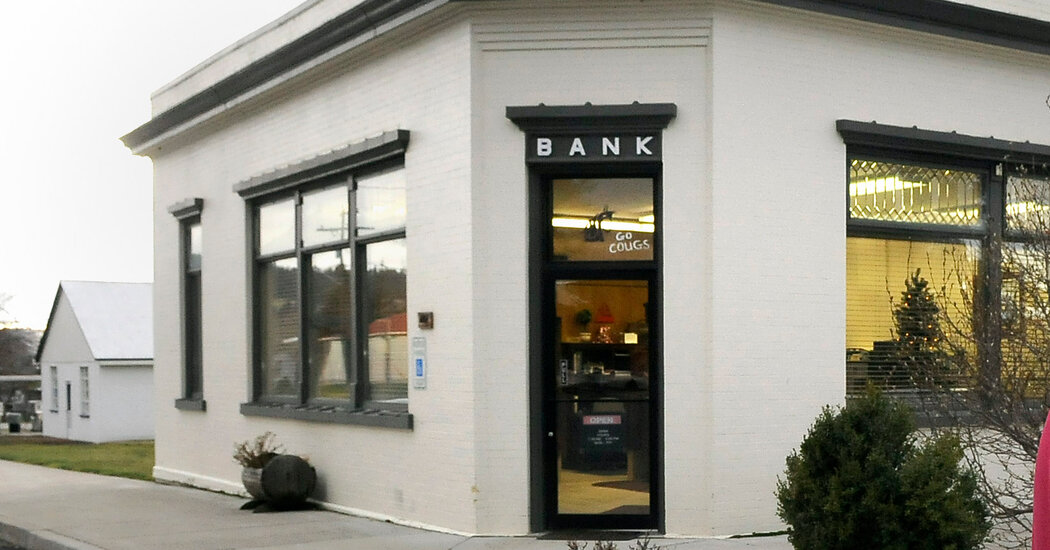Among the many surprising assets discovered in the bankruptcy of cryptocurrency exchange FTX is a relatively small one that could be of great concern: a stake in one of the country’s smallest banks.
Enter the bank, Farmington State Bank Washington State, has one location and only three employees until this year. It did not offer online banking or even a credit card.
The small bank’s connection to the collapse of FTX raises new questions about the exchange and its activities. Among them: How closely is FTX, which was based in the Bahamas, connected to the wider financial system? What else have regulators overlooked? And in the hunt for FTX’s missing assets, how will Farmington be dragged into the billion-dollar bankruptcy?
The ties between FTX and Farmington State Bank began in March when Alameda Research, a small trading firm and sister of FTX, invested $11.5 million in the bank’s parent company, FBH.
At the time, Farmington was the nation’s 26th smallest bank out of 4,800. According to the Federal Deposit Insurance Corporation, net worth was $5.7 million.
The aftermath of FTX’s demise
The sudden collapse of the crypto exchange has stunned the industry.
- A spectacular rise and fall: Who is Sam Bankman-Fried and how did he become the face of crypto? The Daily charted the spectacular rise and fall of the man behind FTX.
- A symbiotic relationship: Mr. Bankman-Fried’s built FTX in part to support the trading activities of Alameda Research, its first company. The ties between the two entities are now coming under scrutiny.
- Missing assets: Lawyers for FTX said a significant portion of the company’s assets had been stolen or missing, casting doubt on the chances of recovering billions of dollars in crypto that customers have lost.
- A bid for influence: In just three years, Mr. Bankman-Fried embarked on a massive operation to convince politicians, regulators and nonprofits to support his crypto goals. Here’s how.
FTX’s investment, which financial regulators say was more than double the bank’s net worth, was led by Ramnik Arora, a top lieutenant of the exchange’s founder Sam Bankman-Fried. Mr. Arora was responsible for many of the much larger deals that FTX signed with Sequoia Capital and other venture capitalists that eventually fell through.
Farmington has more than one crypto connection. FBH bought the bank in 2020. The chairman of FBH is Jean Chalopin, who not only co-created cartoon agent Inspector Gadget in the 1980s, but is also chairman of Deltec Bank, which, like FTX, is based in the Bahamas. . Deltec’s best-known client is Tether, a $65 billion crypto company that offers a stablecoin pegged to the dollar.
Tether has long struggled with financial concerns, in part due to its reclusive owners and offshore bank accounts. Through Alameda, FTX was one of Tether’s largest trading partners, raising concerns that the stablecoin could have undiscovered ties to FTX’s fraudulent operations.
Before the acquisition, Farmington’s deposits had been stable for a decade at about $10 million. But in the third quarter of this year, the bank’s deposits rose nearly 600 percent to $84 million. Nearly all of that increase, $71 million, came from just four new accounts, according to FDIC data.
It’s not clear what FTX’s plan was for Farmington. Farmington now goes online through Moonstone Bank. The name was registered as a trademark a few days before FTX’s investment. Moonstone’s website says nothing about Bitcoin or any other digital currency. It says that Moonstone wants to support “the evolution of next-generation finance”.
Deltec and Moonstone did not return a request for comment.
It is unclear how FTX was allowed to buy a stake in a US-licensed bank, which would have to be approved by federal regulators. Banking veterans say it’s hard to believe that regulators would have knowingly given FTX control of a US bank.
“The fact that an offshore hedge fund that was essentially a crypto firm purchased a stake in a small bank for multiples of its stated book value should have raised huge red flags for the FDIC, state regulators and the Federal Reserve,” said Camden Fine. , a banking industry consultant who formerly headed the Independent Community Bankers of America. “It’s just amazing that all of this has been approved.”

